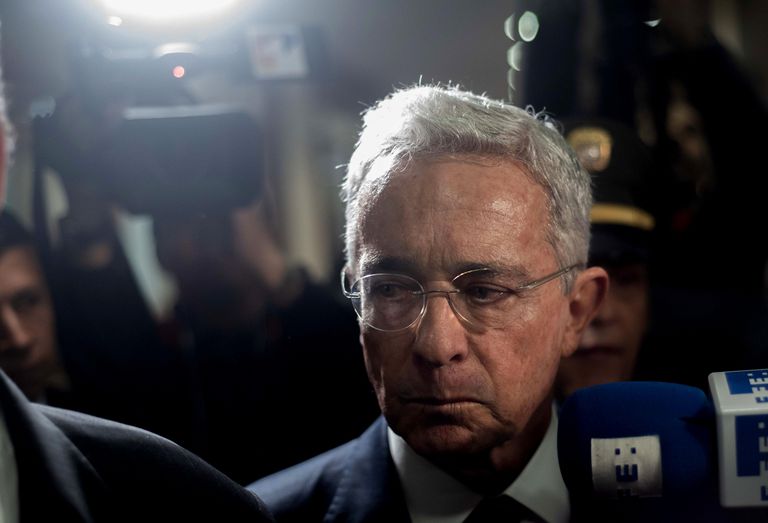RIO DE JANEIRO, BRAZIL – Colombia’s Supreme Court on Tuesday, August 4th, ordered the pre-trial detention of ex-President Álvaro Uribe for the crime of bribery and witness manipulation in one of the cases involving the politician, who ruled the Andean country between 2002 and 2010.
The Court, which granted the ex-president house arrest, is investigating a case in which several witnesses received compensation in exchange for testifying in favor of the current senator.
Among such testimonies was that of a former paramilitary who in a first trial stage had involved Uribe in the creation of a United Self-Defense bloc in Colombia.

This is an unprecedented decision in Colombia. Uribe, founder of the current ruling party, the Centro Democrático, and President Iván Duque’s political mentor, holds a seat in Congress after becoming the most voted senator in the country’s history in 2018.
His case dates back to 2012, when he lodged a complaint with the Supreme Court against progressive senator Iván Cepeda for an alleged plot, with false witnesses in Colombian prisons, to involve him in paramilitary group activities.
However, the high court refrained from prosecuting Cepeda and instead ordered an investigation into Uribe on suspicion of manipulating witnesses against the Polo Democrático congressman.
Uribe himself confirmed the Court’s decision om his social media, which in legal terms, and according to Colombian law is a “measure of constraint”. “The deprivation of my freedom saddens me deeply for my wife, my family and for the Colombians who still believe that I have achieved something good for the country,” he wrote on his Twitter.
At this stage, the investigation focuses on determining whether individuals linked to him, such as his attorneys, and with his consent, have paid and offered legal benefits to ex-paramilitaries to recant.
The original complaint by a paramilitary points out that a group of self-defense forces was created on a former Uribe family estate. They were the ’12 Apóstolos’ (12 Apostles) who, among threats to the population, collusion with the security forces, detentions and a close relationship with Santiago Uribe, the ex-president’s brother, operated on a family farm, according to a group of witnesses.
The Court’s ruling was preceded, the day before, by heated controversy involving statements by high-level government officials, the Democratic Center, judicial authorities, and President Duque himself. “I will always believe in Álvaro Uribe’s innocence,” he said. “I believe he is a person who has the word honorability in his entire conduct,” he reiterated Monday on Radio Caracol.
The opposition sectors considered the multiple pronouncements as pressure on the court. Senator Cepeda had asked the Democratic Center “to cease its attempts to intimidate and put pressure on the Court’s magistrates,” and Duque to behave as the head of state “and not as a public defender of his political mentor”.
Around midnight on Monday, all the High Courts issued an uncommon joint statement calling for respect for the judiciary and its independence. “There are legal steps available to challenge the judicial measures. Consequently, disqualifying legal rulings which have not yet been adopted and without yet knowing their content, meaning or scope is unacceptable,” they declared.
Uribe is perhaps the politician who most divides Colombian society. Loved and hated, a fierce detractor of the peace agreements with the FARC reached in 2016 by his successor, Juan Manuel Santos, a whole political current has formed around him, called Uribism, which in practice embodies radical right-wing positions.
During his two terms he promoted a security policy applauded by the more conservative sectors for its strongarm approach, but simultaneously pointed out as a breeding ground for the so-called false positives, hundreds of out-of-court executions of civilians later offered by the military as guerrillas falling in combat in exchange for benefits.
According to a Prosecutor’s Office report published last year, there were at least 2,248 out-of-court executions between 1998 and 2014, although 97 percent of cases occurred between Uribe’s first and second terms.
Source: El País

